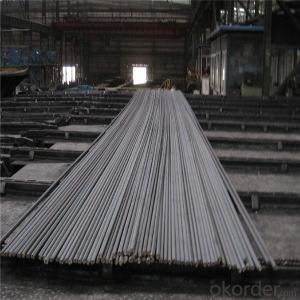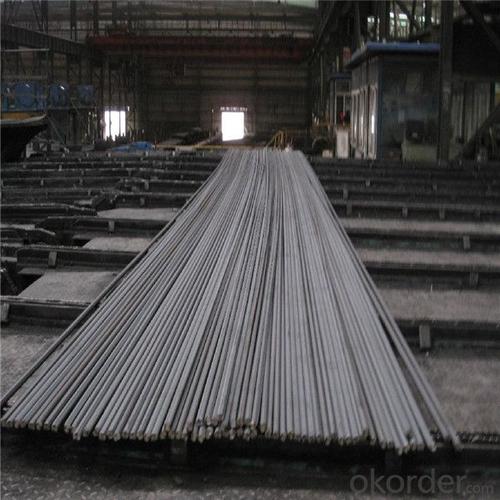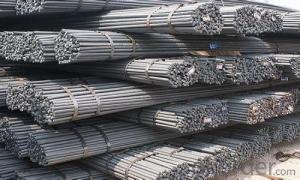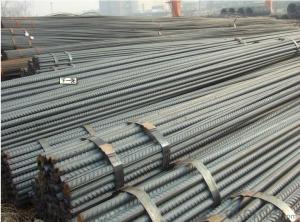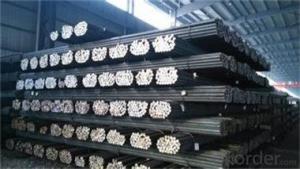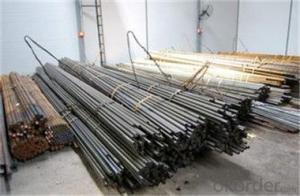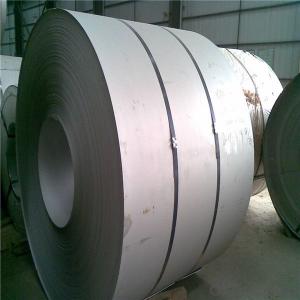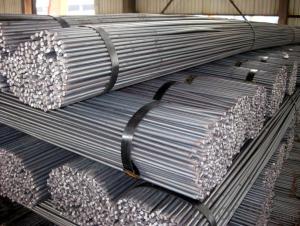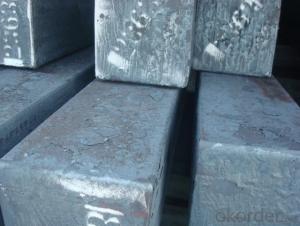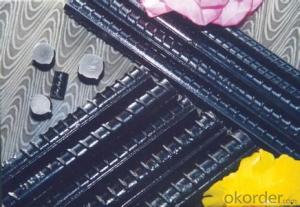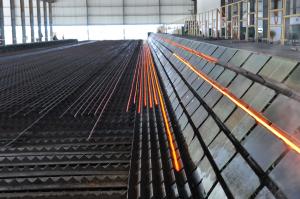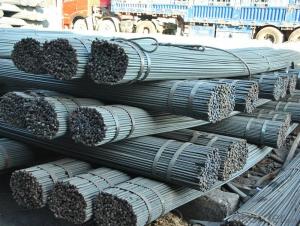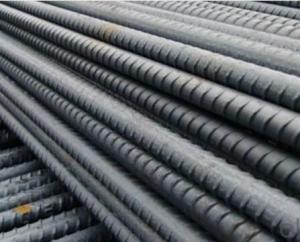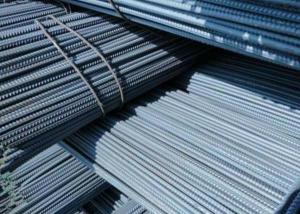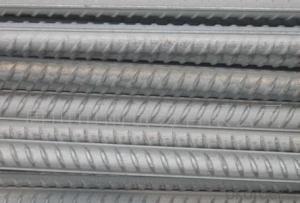Hot rolled steel rebar factory price of china mill
- Loading Port:
- Ningbo
- Payment Terms:
- TT OR LC
- Min Order Qty:
- 100 m.t.
- Supply Capability:
- 19000 m.t./month
OKorder Service Pledge
OKorder Financial Service
You Might Also Like
Specification
Rebar is common steel reinforcing bar, an important component of reinforced concrete and reinforced masonry structures.
It is usually formed from mild steel, and is given ridges for better frictional adhesion to the concrete.
Concrete is a material that is very strong in compression, but virtually without strength in tension. To compensate for this
imbalance in concrete's behavior, rebar is formed into it to carry the tensile loads.
.Most grades of steel used in rebar cannot accept welding; such as, to adjacent steel plates or as means to bind single
pieces of rebar together. However, special grades of rebar steel and welding rods make welding by expert welders possible.
Features
1、Pure steel quality, stable chemical contents, small tolerance.
2、Constant Quality, good drawing performance.
3、High dimension accuracy degree, accuracy degree of Level C up to 80%, smooth surface, less scale, easy to be pickled.
4、Automatic bundling with 4 lines by Machine in tidy and good looks
5、Big high quality percentage, small coil percentage, and heavy coil weight for Hard Coil.
6、High sorbitizing percentage.
Product Description :
Chemical composition (%): | Steel | C | Si | Mn | P | S | Ceq | ||||
HRB335 |
0.25 |
0.80 |
1.60 |
0.045 |
0.045 | 0.52 | |||||
HRB400 | 0.54 | ||||||||||
HRB500 | 0.55 | ||||||||||
Mechanical properties | Steel | Rel/ MPa | Rm/ MPa | A/ % | Agt/ % | ||||||
≥ | |||||||||||
HRB335 | 335 | 455 | 17 |
7.5 | |||||||
HRB400 | 400 | 540 | 16 | ||||||||
HRB500 | 500 | 630 | 15 | ||||||||
Package: | Standard export packing or as customer's request | ||||||||||
Application: | Construction, building, bridge, road. ect | ||||||||||
Payment terms | 1).100% irrevocable L/C at sight. | ||||||||||
Delivery time | 15-30 days after receipt of L/C or deposit by T/T | ||||||||||
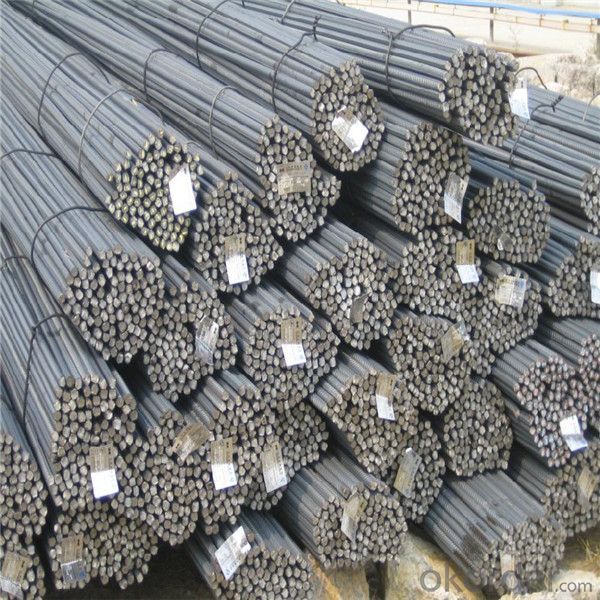
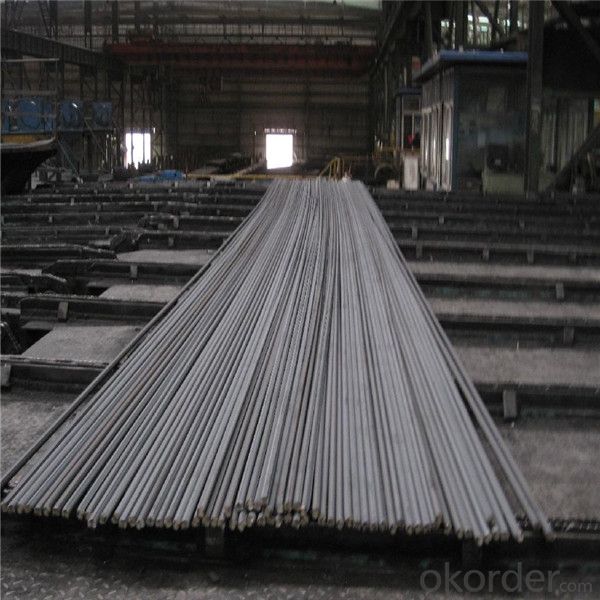
Packing:
In bundles, each bundle weight 3.5 tons. Load by container or by bulk verssel.
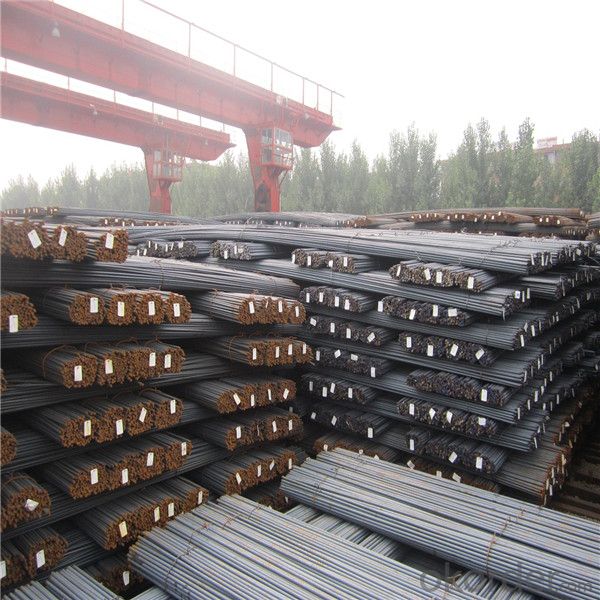

Our service
(1) We cooperate with famous factories with advanced equipment and well trained workers.
(2) We can provide factory price with trading company service.
(3) We continuously work on the improvement of our processes, guaranteeing consistently high standards
of quality to keep none compensation.
(4) We guarantee 24 hours response and 48 hours solution providing service.
(5) We accept small order quantity before formal cooperation.
(6) We deliver the agreed quality at the agreed time, reacting to changes in customer wishes in a flexible way.
(7) Due to our volume and selling power, we have excellent freight rates with shipping lines.
(8) We strive to always be fair and honest in our dealings with customers.
(9) We strive to work together with customers to achieve much more than we can achieve alone.
(10) Through our passion and commitment we aim to be a market leader in all our key markets. To maintain
our position as market leader we must continue to add value in all that we do.
FAQ:
1.Q: What's your MOQ(minimum order quantity)?
A: One full container, mixed acceptable .
2. Q: What's your packing methods?
A: Packed in bundle or bulk ..
3. Q: How can I buy CNBM products in my country?
A:Please send us an inquiry or email ,we will reply to you if there is distributor in your country
4. Q: Can we visit your factory?
A: Warmly welcome. Once we have your schedule, we will arrange the professional sales team to follow up your case.
5. Q: How long does it take to get the product if i place an order?
A:With the process of your requirements,we will pack and deliver in 3-7 days. If it is by sea shipment,it will take 15-45 days depending on different locations
- Q: Are there any environmental concerns related to steel rebars?
- Yes, there are some environmental concerns related to steel rebars. The production of steel rebars involves the extraction of iron ore, which can lead to habitat destruction and deforestation. The manufacturing process also requires a significant amount of energy, contributing to greenhouse gas emissions. Additionally, steel rebars are typically coated with epoxy or other materials that contain harmful chemicals, posing risks to both human health and the environment during their production and use. Proper disposal and recycling of steel rebars are also important to minimize their environmental impact.
- Q: What are the guidelines for inspecting and testing steel rebars on-site?
- The guidelines for inspecting and testing steel rebars on-site typically include visually examining the rebars for any visible defects such as rust, cracks, or bends. Additionally, non-destructive testing methods like ultrasonic testing or magnetic particle inspection may be employed to detect any internal flaws or inconsistencies in the rebars. It is also crucial to ensure that the rebars meet the specified dimensions, lengths, and quality standards as per the project requirements. Regular sampling and testing of rebars are essential to maintain the structural integrity and safety of the construction project.
- Q: What are the precautions to be taken while welding steel rebars?
- When welding steel rebars, there are several precautions that need to be taken. First and foremost, it is crucial to wear appropriate personal protective equipment such as a welding helmet, gloves, and a protective apron to shield against sparks, heat, and UV radiation. Additionally, proper ventilation in the work area is necessary to prevent the accumulation of harmful fumes and gases. It is important to ensure that the rebar is clean and free from any contaminants or coatings that could affect the quality of the weld. Welding should only be performed by trained and qualified individuals who understand the specific techniques and settings required for welding rebars. Finally, regular inspections of the welds should be conducted to ensure their integrity and strength.
- Q: What is the effect of welding on the properties of steel rebars?
- The effect of welding on the properties of steel rebars can vary depending on various factors such as the welding process, parameters, and the quality of the weld. Generally, welding can introduce localized heat, which may lead to changes in the microstructure and mechanical properties of the rebars. These changes can include the formation of a heat-affected zone (HAZ) with altered hardness, strength, and toughness. Additionally, the weld itself may have different properties compared to the base metal, such as lower ductility or higher susceptibility to cracking. Therefore, it is crucial to carefully control the welding process and ensure proper welding techniques to minimize any adverse effects on the rebars' properties.
- Q: What are the guidelines for the proper anchoring of steel rebars in columns?
- The guidelines for the proper anchoring of steel rebars in columns are essential to ensure the structural integrity and safety of the reinforced concrete structure. These guidelines are typically based on industry standards and codes, such as the American Concrete Institute (ACI) Building Code Requirements for Structural Concrete (ACI 318). 1. Lap Length: The lap length is the minimum distance required for the overlapping of rebars to provide sufficient bond strength. It is determined based on the rebar diameter, grade, concrete strength, and design requirements. The ACI 318 provides specific formulas and tables to calculate the required lap length. 2. Embedment Length: The embedment length refers to the portion of the rebar that is embedded within the concrete column. It is important to achieve adequate embedment to transfer the applied loads effectively. The embedment length is determined based on factors such as rebar diameter, grade, and the compressive strength of concrete. 3. Development Length: The development length is the minimum length of rebar required beyond the point of critical section to develop its full tensile or compressive strength. It ensures that the rebar can resist the applied loads and prevent premature failure. The ACI 318 provides formulas to calculate the development length based on rebar diameter, grade, concrete strength, and design requirements. 4. Concrete Cover: The concrete cover refers to the thickness of concrete between the external surface of the rebar and the outer surface of the column. It provides protection against corrosion, fire, and other environmental factors. The required concrete cover is determined by considering factors such as rebar diameter, grade, exposure conditions, and design requirements. The ACI 318 provides minimum cover requirements for different rebar sizes and exposure conditions. 5. Spacing and Positioning: The rebars should be properly spaced and positioned within the column to ensure uniform load distribution and effective reinforcement. The spacing is determined based on the column dimensions, rebar diameter, and design requirements. Additionally, the rebars should be properly aligned and centered within the column to provide the intended structural strength. 6. Mechanical Anchorage: In some cases, mechanical anchorage devices, such as rebar couplers or headed bars, are used to improve the anchoring of rebars in columns. These devices provide enhanced load transfer and prevent slippage between rebars. The selection and installation of mechanical anchorage should comply with the manufacturer's recommendations and relevant standards. 7. Quality Control and Inspection: It is crucial to implement proper quality control and inspection procedures during the installation of rebars in columns. This includes verifying the dimensions, lap lengths, embedment lengths, development lengths, concrete cover, spacing, and positioning of the rebars. Regular inspections and non-destructive testing techniques, such as ultrasonic or radiographic testing, can be employed to ensure compliance with the guidelines and detect any defects or deviations. It is important to note that these guidelines may vary depending on the specific design requirements, local building codes, and structural considerations. Therefore, it is recommended to consult the relevant standards and seek professional advice from structural engineers or experts to ensure proper anchorage of steel rebars in columns.
- Q: What is the cost of steel rebars compared to other materials?
- The cost of steel rebars is generally higher compared to other materials commonly used in construction, such as wood or concrete. However, steel rebars offer superior strength, durability, and longevity, making them a preferred choice for applications requiring high structural integrity and resilience. The higher initial investment in steel rebars is typically outweighed by their long-term benefits and reduced maintenance costs.
- Q: How do steel rebars provide flexibility to concrete structures?
- Concrete structures can benefit from the flexibility provided by steel rebars in multiple ways. Firstly, the addition of steel rebars reinforces the concrete, enhancing its tensile strength. While concrete is strong in compression, it is weak in tension. By incorporating steel rebars, the concrete becomes more resistant to bending and cracking, as the rebars can absorb the tensile forces that would otherwise cause failure. This reinforcement enables concrete structures to withstand heavier loads and offers flexibility by preventing excessive deformation or collapse. Secondly, steel rebars can be utilized to construct a reinforced concrete frame, which boosts the overall flexibility of the structure. When embedded in the concrete, the rebars form an interconnected network of elements that distribute applied loads more evenly. This network acts as a flexible skeleton capable of adapting to various stresses, such as temperature changes, ground movements, or dynamic forces. As a result, the structure can accommodate minor movements or vibrations without sustaining significant damage. Additionally, steel rebars can be strategically positioned in areas where additional flexibility is required. For instance, in regions prone to seismic activity, rebars can be concentrated in critical areas like building joints or corners. This placement helps dissipate the energy generated during an earthquake, allowing the structure to deform and absorb seismic forces without collapsing. The flexibility provided by steel rebars enhances the seismic resistance of the concrete structure. To summarize, steel rebars contribute to the flexibility of concrete structures by increasing their tensile strength, creating a reinforced concrete frame, and allowing for strategic placement to enhance specific areas of flexibility. This flexibility enables concrete structures to withstand diverse loads, adapt to various stresses, and improve their overall strength and durability.
- Q: What is the process of threading steel rebars?
- The process of threading steel rebars involves using a specialized machine to cut threads onto the ends of the rebars, which allows them to be easily connected together. This threading process enhances the structural integrity, stability, and overall strength of the rebars when used in construction projects.
- Q: How do steel rebars affect the overall crack resistance of concrete structures?
- The crack resistance of concrete structures is greatly improved by steel rebars, which have a crucial role to play. When embedded in concrete, rebars provide reinforcement and boost the tensile strength of the structure. While concrete is naturally strong in compression, it is weak in tension, and rebars help overcome this weakness by absorbing the tensile forces that may result in cracks. The inclusion of rebars in concrete structures allows for stress redistribution, thereby preventing cracks from spreading. As concrete shrinks or experiences external loads, rebars act as a reinforcement grid, effectively resisting the formation and expansion of cracks. By absorbing and dispersing the tensile stresses, rebars ensure that the concrete remains intact and can withstand heavier loads without significant cracking. Furthermore, steel rebars contribute to the overall durability of concrete structures. When rebars corrode due to exposure to moisture or other environmental factors, they can increase in volume, resulting in internal pressure and potential cracking of the concrete. However, the use of corrosion-resistant rebars, such as epoxy-coated or stainless steel rebars, can greatly reduce this risk and enhance the crack resistance of the structure. To summarize, steel rebars enhance the crack resistance of concrete structures by providing reinforcement, increasing tensile strength, redistributing stress, and preventing crack propagation. Their presence guarantees that the structure can withstand various types of loads and environmental conditions, ultimately improving the strength and durability of the concrete.
- Q: Can steel rebars be used in underground construction?
- Yes, steel rebars can be used in underground construction. Steel rebars are commonly used in the construction of underground structures such as tunnels, foundations, and retaining walls due to their high strength and durability. They provide reinforcement and enhance the structural integrity of the underground construction, making it capable of withstanding various loads and pressures.
Send your message to us
Hot rolled steel rebar factory price of china mill
- Loading Port:
- Ningbo
- Payment Terms:
- TT OR LC
- Min Order Qty:
- 100 m.t.
- Supply Capability:
- 19000 m.t./month
OKorder Service Pledge
OKorder Financial Service
Similar products
Hot products
Hot Searches
Related keywords
